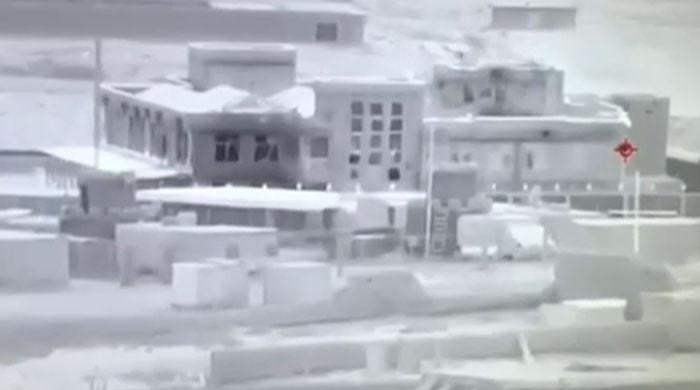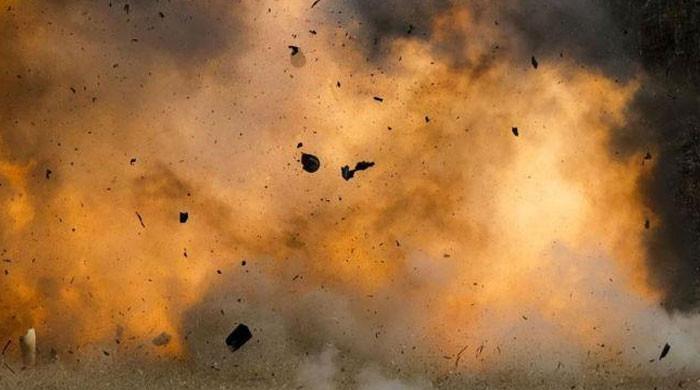More breaches expected at Manchar Lake as overflow continues
Sources say two new breaches to be made to embankment of Pakistan's largest freshwater lake
September 05, 2022
- Irrigation department officials say level of water was last recorded at 25 feet.
- Sources say two new breaches may be made to embankment.
- Water continues to overflow from different points at Manchar Lake.
The city administration has decided to make two more breaches to the embankment at Manchar Lake as the water level has yet to recede due to the continuous deluge from Balochistan.
The dyke has already been breached once at the RD-14 point near Bagh-e-Yousuf due to the increased risk of the embankment breaking down as the water pressure grew.
Authorities in flood-hit Pakistan first breached the country's largest freshwater lake on Sunday, displacing up to 100,000 people from their homes but saving more densely populated areas from gathering flood water, a minister said.
Record monsoon rains and melting glaciers in Pakistan's northern mountains have brought floods that have affected 33 million people and killed at least 1,290, including 453 children. The inundation, blamed on climate change, is still spreading.
Manchar Lake, Pakistan's largest freshwater lake is used for water storage, and had already reached dangerous levels. The increased pressure posed a threat to surrounding areas in Sindh, Irrigation Minister Jam Khan Shoro said.
He said about 100,000 people would be affected by the breach but it would help save more populated clusters and also reduce water levels in other, harder-hit areas.
Officials from the irrigation department said that the water level in the lake was last recorded at 25 feet.
Sources said that breaches can be made to the embankment at the RD-55 and RD-80 points as there has been continuous overflow from different points of Manchar Lake.
The officials said that the water pressure will subside and will flow into the Indus River through Kiran Pur and Indus Link after the breaches are made.
The authorities had ordered the residents of nearby localities to move to safer areas due to the increased risk of the embankment breaking down consequent inundation of five union councils in Sehwan.
"By inflicting the breach we have tried to save Sehwan town. Water levels on Johi and Mehar towns in Dadu district would be reduced by this breach in the lake," Shoro had told Reuters.
Some displaced by the floods in Pakistan have complained that shelters are crowded, while others are reluctant to leave their possessions.
Aside from historic rainfall, southern Pakistan has had to contend with increased flooding as a surge of water flowed down the Indus river.
The country has already received nearly three times the 30-year average rainfall in the quarter through August, totalling 390.7 millimetres (15.38 inches). Sindh province, with a population of 50 million, was hardest hit, getting 464% more rain than the 30-year average.
Being downstream on the Indus River, the southern parts of the country have witnessed swelling river waters flowing from the north. Pakistan's limited dams and reservoirs are already overflowing and cannot be used to stop downstream flows.
Tarbela dam in the north-west, has been at capacity - 1,550 feet and 5.8 million acre feet - for weeks, according to National Disaster Management Authority (NDMA) data.
Downstream in Sindh, barrages are under pressure with the Indus River in high flood level, the NDMA said in its latest situation report.
Authorities also prepared for more rain in the north over the next few days up until Tuesday.
"Pakistan Meteorological Department (PMD) has forecast that weak monsoon currents from Arabian Sea are penetrating upper and central parts of the country which subsequently cause rain-wind / thundershowers," the NDMA said in an advisory.
It cautioned local administrations to be on an enhanced state of alertness, and to restrict vehicle movement in areas prone to flash floods and landslides as well as those close to water channels.
It said some populations in the north could be at risk, and advised "timely evacuation".
The overnight death toll from the floods increased by 25, of which 12 were children, according an NDMA update. The United Nations children's agency UNICEF said there was a risk of "many more" child deaths from disease after floods.
Prime Minister Shehbaz Sharif on Sunday appealed to UNICEF and other global agencies to help control child deaths.
"As Pakistan battles one of the worst climate-induced calamities, among the most adversely affected are children," Sharif said on Twitter.
On Sunday, flights carrying aid from UNICEF, Qatar and the United Arab Emirates landed in Pakistan.
With additional input from Reuters











